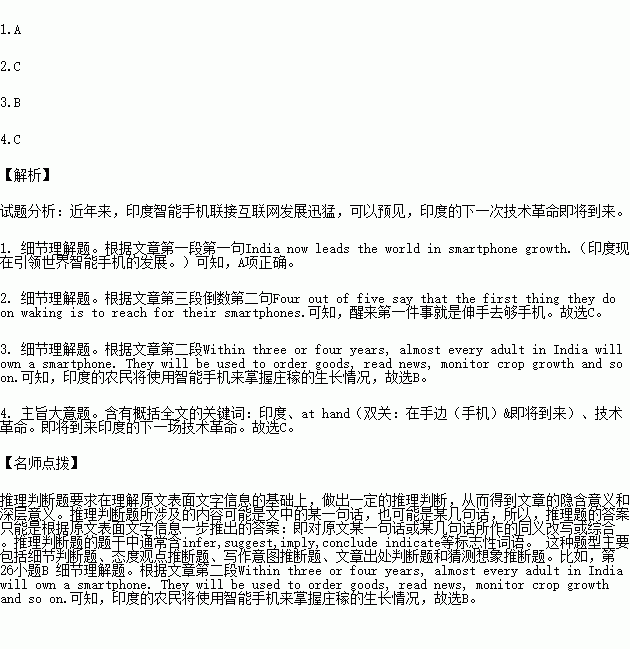题目内容
India now leads the world in smartphone growth. It saw a 55% increase in the number of smartphones in 2014. The number of Web users increased by 37%. Smartphones were the source of 65 % of its Internet traffic and 41 % of its e-commerce, according to a report by the analyst Mary Meeker, titled “Internet Trends 2015”.
India’s Internet boom has started. Within three or four years, almost every adult in India will own a smartphone. They will be used to order goods, read news, monitor crop growth and so on.
Indian adults will be very interested in these devices just as young Americans are. 87% of Americans between the ages of 18 and 34 who own smartphones say they never separate from these: “My smartphone never leaves my side.” Four out of five say that the first thing they do on waking is to reach for their smartphones. And three fifths believe that in the next five years everything will be done on mobile devices.
In the business world, the rise of mobile platforms is dramatically transforming many industries all over the world. What Indian software developers have to do is to start thinking about solutions to old problems by using all the features of these new devices. They need to take advantage of the unique properties of smartphones and tablets. As Indian software developers and enterprises master the smartphone, they will be able to export their solutions to the rest of the world.
This will make possible a new tech revolution that is greater than what created India’s IT industry in the 1980s and 1990s. We can expect the rapid transformation of India when a billion people become connected and have equal access to information and services.
1.Loads of numbers are used in Paragraph 1 to show _____________.
A. India’s smartphones increase most rapidly in the world
B. India has the most advanced IT industry in the world
C. India will be a superpower pretty soon
D. India will export new smartphones to the rest of the world
2.What will most young Americans do first the moment they wake up?
A. Read news.B. Shop online.
C. Get their smartphones.D. Check e-mails.
3.Which of the following is TRUE according to the passage?
A. India is the largest mobile maker in the world.
B. Indian farmers will probably use smartphones to monitor crop growth.
C. Indian software developers have made great profits by selling their products abroad.
D. India saw a great boom in IT industry some 30 years ago.
4.Which can be the best title of the text?
A. More people,more smartphones
B. No dream, every Indian owns a smartphone
C. At hand, India’s next tech revolution
D. A small smartphone, a big use

